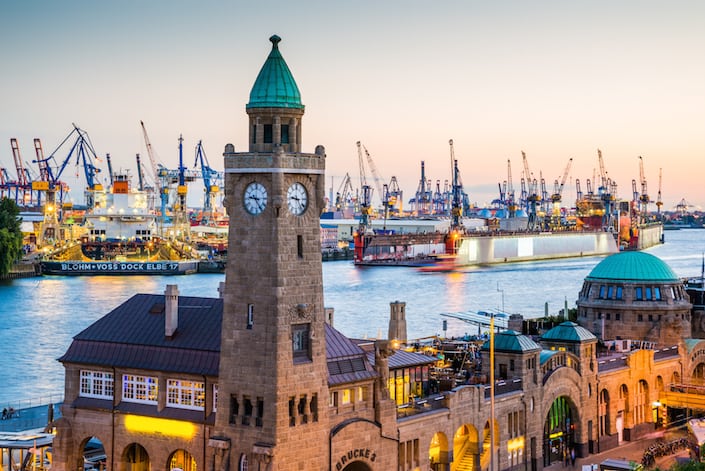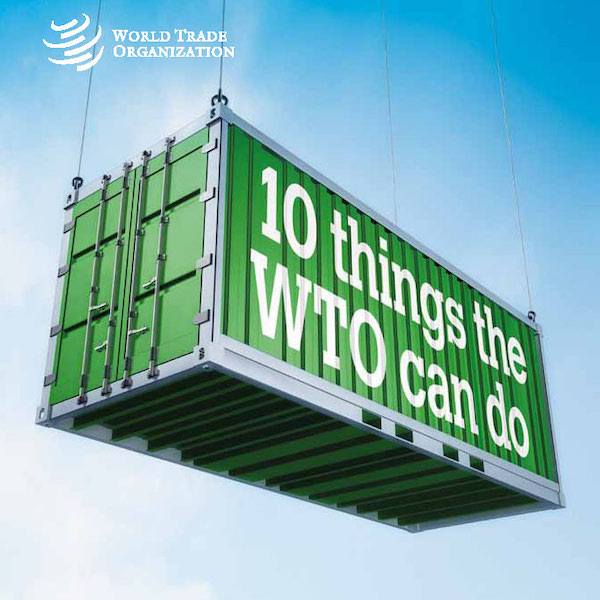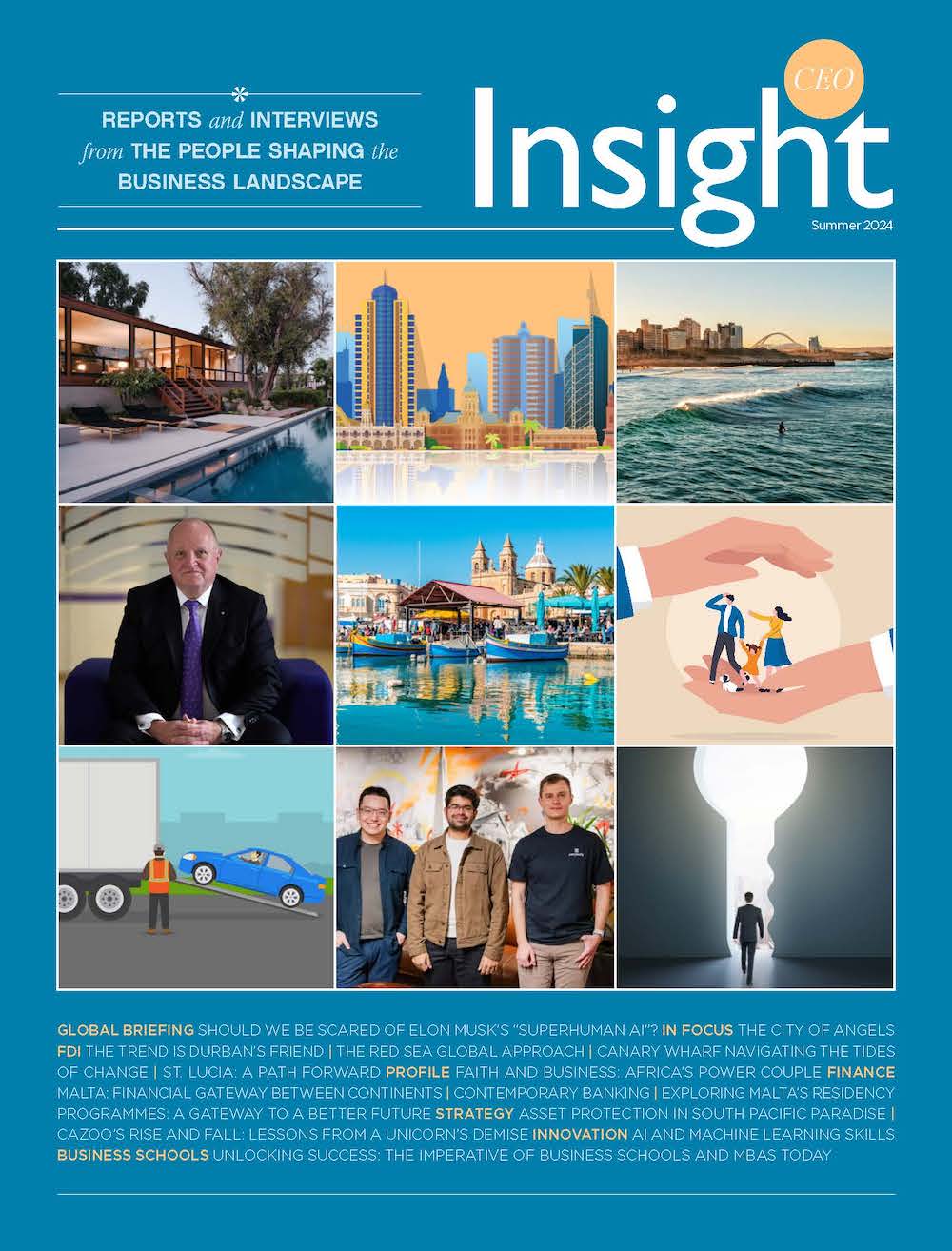Cover Story – Germany Open for Business
Share

Germany is the new hotspot for doing business and investing in Europe. As the largest market in the region and the fourth largest economy in the world, this country is one of the most attractive locations for companies and investors looking for accessibility, profitability and stability. It is the main economic engine in the EU, with one of the highest productivity rates in the world.
With a diverse economy and strong technology, finance, automobile, aviation, industrial production, medicine and even precious metal production sectors, Germany offers a highly skilled labour force and access to leading research and development facilities. It has a sophisticated infrastructure and a competitive legal and tax framework for business development and foreign direct investment.
In 2017, the German economy expanded by over 2.3%. This momentum is driving investment into the country, with FDI inflows at over €10bn and more than 80,000 foreign companies operating there. Moreover, its political stability, geographic advantages and friendly policies are enhancing growth and strengthening its position as an economic engine and regional business hub. Germany is without doubt open for business.
Hamburg: next port of call
One of the top locations in Germany is Hamburg. This exciting and innovative city is attracting companies and businesses from all over the world, offering unique opportunities in logistics, aviation, real state, transport, energy, finance, media and tourism among others. With over 1.8 million inhabitants, it is the second-largest city in Germany and is a dynamic, fast-growing and innovative location for business with all the perks of a cosmopolitan city.
The Metropolitan Region of Hamburg is one of the major trading centres of the continent and ranks as the leading location for doing business in Germany. According to the Financial Times’ fDi magazine, it is the most appealing location in the country for European and international investors given its economic potential, technological infrastructure, highly skilled labour force, and friendly business environment.

Hamburg harbour, Germany’s largest universal port and the third largest in Europe, is one of the most dynamic trading spots on the continent and has attracted more than 700 companies. It sees huge volumes passing through and is on an upward trajectory as it competitiveness improves versus other main ports in Northern Europe. Moreover, modernisation and expansion of the port are top of the government’s agenda, promising new business possibilities and greater capacity for trade.
“HAMBURG HARBOUR, GERMANYS LARGEST UNIVERSAL PORT AND THE THIRD LARGEST IN EUROPE, IS ONE OF THE MOST DYNAMIC TRADING SPOTS ON THE CONTINENT AND HAS ATTRACTED MORE THAN 700 COMPANIES.”
The city has an exceptional corporate infrastructure. It is a powerhouse, with the highest GDP per capita in the country and an economic performance comparable to London, Brussels or Luxemburg. Its quality of life, culture and entertainment offering make it a top option for companies looking to invest in Germany. Hamburg will be the European Capital of Innovation 2020, and according to fDi Magazine, FDI is mostly in the business sector, followed by IT and software. However, with the extension of the airport and ongoing improvements in infrastructure, transport, aviation, renewable energy and maritime trade, Hamburg’s potential is being enhanced.
Investment into the region is playing a major role in Germany’s overall development, with the political infrastructure and business climate supporting growth. Organisations like Hamburg Invest provide services for small and medium-size companies looking to do business, expand, restructure and/or settle in Hamburg, while promoting it as a business location. Hamburg is moving forward, and it is due to remain among Europe’s main engines of innovation and development.
Frankfurt: a tale of trade fairs and business networking
Germany is one of the main business centres in Europe, and as such many businesses have arisen to respond to the needs of those wanting to invest and/or do business. Venues for corporate or commercial events are very popular among investors, clients and entrepreneurs who want to interact and connect. And this is exactly what Frankfurt can offer: networking services, from fairs to corporate congresses, and all in astonishing venues. This city lures bankers, traders, business people and leaders from all over the world.

The city is a corporate and business giant that houses one of the largest stock exchanges in the world, more than 200 banks and the new headquarters of the ECB and European Insurance and Occupational Pensions Authority. Furthermore, Frankfurt is the world’s largest data hub, empowering the booming ICT and a finTech sector. This sector has been strengthening its position as an outbound direct investment hub for Chinese and American companies looking to enter the EU.
Frankfurt has been a mercantile hub since the 12th century due to its geographical location and its organisational infrastructure for trade and business. It is no coincidence that it is called “the crossroads of Europe” given its traditional role connecting European trade, commerce and business. Frankfurt’s trade fairs thus remain among the top businesses developing in the core of the city’s economic engine.
Some of the largest fairs in Europe are held in Frankfurt every year. Textile fairs like Heimtextil, the International Motor Show, the Frankfurt book fair, the International Frankfurt Trade Fair and the annual meeting of the Asian Development Bank are just some of the examples of the kind of events that encourage business development, networking and event entertainment. This sector is growing by connecting those with resources with those looking for resources.

Messe Frankfurt is one of the largest companies in the field of trade fairs, congresses and event organisation, not just in Germany but worldwide. With many years of experience, it is where corporations, entrepreneurs and businessmen go to make the magic happen. Their main location (366,000 square metres and 90 congress halls) hosts more than 260 trade fairs and events every year. Just in 2017, they had more than 95,000 exhibitors and 4.3 million visitors.
As Frankfurt races to be the next financial capital of Europe after Brexit, several banks and companies are looking to settle in the crossroads of Europe and bring their resources and investments with them. In the process, networking and business encounters will play a prominent role. As Frankfurt grows, opportunities will arise for spaces like Messe Frankfurt to keep channelling development in Germany and expand the possibilities of business.
Hessen: an open invitation to the European Union
Much has been said about the economic opportunities that Germany offers investors looking for stability, profitability and innovation. And within Germany, the state of Hesse is now increasingly being recognised as a hotspot for economic development and technology creativity. The state not only contains one of the fastest growing cities in the country – Frankfurt – but it is also one of the most important regions for such industries as automobiles, pharmaceuticals, chemicals, medicine and bio-technology.
It is no surprise that Hesse has one of the highest GDPs per employee in Europe, as it encompasses everything that represents German development. It is almost impossible not to think about cars, medicine or industrial products when German industry is brought up. Those traditional industries are part of the core engine of growth in Hesse, but the state has achieved its economic dynamism by diversifying and being at the forefront of innovation in energy, aeronautics and aviation, logistics, IT and data services and, of course, financial and finTech services.

According to Hessen Trade & Invest, the state’s economic development agency, foreign investment into the region has been steadily rising in recent years, and there are now more than 170 foreign companies, led by Chinese, American and English firms. FDI in region is around €75m annually, and more than 12,500 foreign companies are now actively doing business in Hesse. Moreover, about a third of FDI is in sales and marketing, strengthening the logistics and distribution networks of the state and therefore its trading capacity in and out of the European Union.
What is the secret behind Hesse’s success? First of all, active support for industrial and corporate development through an established network of economic promotion. Second, a strong infrastructural and legal framework to support investment. Third, high levels of investment in R&D and education. And least but not last, the provision of high-quality infrastructure and services that guarantee a high quality of life.
No doubt Hesse will keep improving its position as an industrial and trade following the decision of the UK to leave the EU. For instance, it is aiming to become the new gateway to the EU market for China and North America, among others. According to Rainer Waldschmidt, CEO of Hessen Trade & Invest GmbH, “…we are now working more intensively to attract foreign companies to Hessen who have located their European headquarters in Great Britain up to now.”
Hesse’s outstanding economic, logistics and infrastructural capacity is not just embodied in Frankfurt and Wiesbaden’s rapid growth but in the state’s potential to develop. Whatever the result of the post-Brexit agreement between the UK and EU, Hesse will give the rest of Europe a run for its money in terms of foreign investment, and it is on track to become one of the strongest links in Europe’s economic development, if it is not so already.
The golden city of Pforzheim and the Schmuck Museum
In the state of Baden-Württemberg you will find the so-called Golden City – or Goldstadt in German. Pforzheim has more than 120,000 inhabitants and is traditionally known for its jewellery, precious metals and watch-making industry. Indeed, the city still living up to its name. With centuries of experience, this exiting jewellery making hub is home to the Schmuck Museum, the world’s only jewellery museum, and to the renowned School of Design and the Institute of Technology at Pforzheim University.
As one of the main jewellery hubs in Europe for producing, trading, collecting and exhibiting precious metals and watches, the golden city has an astonishing collection of jewels, precious stones and watches that span almost 5,000 years. An invaluable collection from the 19th and 20th centuries is displayed at the Schmuck museum. Currently, the collection contains historical pieces from Greece, Rome as well as the Renaissance, Baroque and Art Nouveau periods.
This dazzling collection displaying golden bars, precious stones, luxurious and curious watches and even a gold-plated Porsche is easily comparable to the jewellery collections at the V&A Museum in London and the Musée des Arts Décoratifs in Paris. However, unlike the later two, it offers a wonderful trip through the history of jewellery, ethnic jewellery from around the world, a modern collection and an amazing history of how a small town became one of jewellery’s industrial giant. This history of gains and losses, development and crisis, is the history of Pforzheim.

So how did Pforzheim become the gold city? Jean Francois Autran, founder of Autran & Viala watchmakers, founded the first jewellery and watch makers, giving birth to the jewellery industry in Pforzheim about 240 years ago. However, it was not until the 19th century, when wristwatches became very fashionable, that the industry flourished and companies like Laco and Stowa and Lange & Söhne rapidly grew and expanded, creating a market that would survive after two world wars and gain vast importance.
After paving the way for national and foreign goldsmiths to set up in the region and create what we know today as the Golden City, Pforzheim now accounts for around 70% of total sales of German jewellery and has the biggest watchmaking industry in the country. Furthermore, its historic value has made it a tourist attraction for many travellers looking to wander through the ins and outs of the culture of jewellery and watchmaking, and it is also a tempting location for investors interested in precious metals.
The Schmuck Museum does a wonderful job of portraying Pforzheim’s history through jewellery and most importantly keeping it alive by attracting tourists, investors, entrepreneurs and students to see and be a part of the magic of the golden city and its magnificent growing industry.
Baden-Baden: high rollers and hot water
Baden-Baden is a fantastic location for congresses, conventions and incentive programs. It boasts exceptional venues, a professional one-stop service and state-of-the-art conference technology. Baden-Baden is a spa town, located at the foothills of the Black Forest in southwestern Germany. It allows for a great mixture of business and pleasure. The atmosphere is relaxing, and with 150 conferences taking place a year, the town has an excellent track record.
There are many natural springs in the Baden-Baden area. These were known to the Romans, and the ruins of a Roman bath were discovered in 1847 and date to the reign of Caracalla (ad 210s), who visited the area to relieve his arthritic aches. The water is rich in salt and flows from artesian wells at a rate of 341 litres per minute, conveyed through pipes to the town’s baths. Baden-Baden is a paradise for anyone who enjoys high-calibre indulgence with its two thermal baths and many wellness hotels.

In terms of venues, Baden-Baden’s offering includes locations situated amidst pristine park landscapes, unforgettable gala dinners accompanied by unique stage shows, and glamorous VIP receptions in one of the most beautiful casinos in the world. The Kongresshaus for example is suitable for all types of events with its three conference rooms, 13 seminar rooms and a large foyer with a large exhibition area. Meanwhile, the Kurhaus is the town’s glittering centre stage, perfect for hosting special events in its grand Belle Epoch styled rooms.
Diversity is the name of the game in Baden-Baden. And that does not just apply to those attending the conferences, but also to their companions. After a long day at the conference, what better way to relax than in either the world-famous Caracalla Spa or the awe-inspiring Friedrichsbad. During the day, seminars and workshops on topics such as health, beauty and wellness are available to the partners of conference participants.
Or how about an unforgettable tour through the Black Forest or a short trip across the French border to Alsace? Conference attendees can also play golf on one of the oldest and prettiest courses in Germany. Elsewhere, a sparkling atmosphere, fast-paced action and nail-biting suspense awaits at the international racecourse in Iffezheim. Meanwhile, the adventurous can try hot air ballooning over Baden-Baden and the Black Forest.
Baden-Baden’s cosmopolitan restaurant scene ranges from Michelin-starred restaurants to cosy taverns, offering both international and traditional local cuisine. Any why not round off the day by trying your luck in the casino, which also has conference facilities for up to 100 persons? The casino’s neo-baroque styled rooms, lavish arcades and ceremonial halls quickly generate a feeling of enchantment in this focal point for Europe’s high society.




























